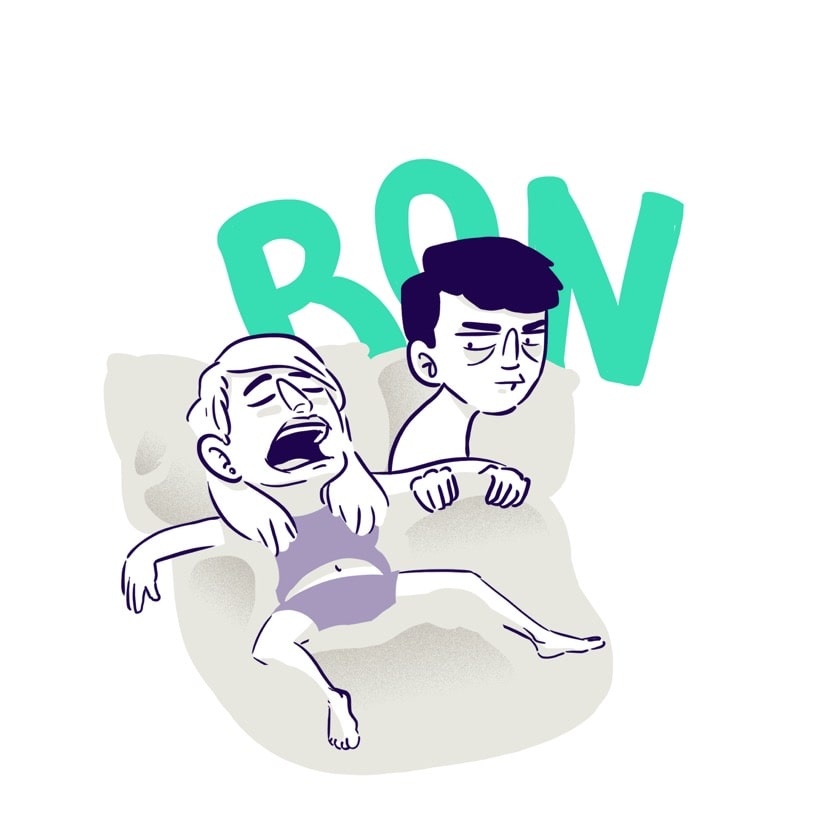Snoring: a symphony in the night!
It rhymes with annoying, restrictive, but above all with noisy. It is a melody (not the one of happiness!) that too often punctuates our nights, and one of the main causes of the "separate bedroom" syndrome for couples, when it is not the source of marital reprimands, or even reproachful and desperate elbow nudges. You guessed it, this is indeed about snoring!
Beyond the smiles and sometimes amusing anecdotes at the mention of its name, this sleep respiratory disorder is not so trivial or harmless, as it has a real impact on the sleep quality of the person affected, but also on their partner, or rather on THEIR partner in most cases. You can read or hear many things about this noisy phenomenon. What can be done against snoring? Are there effective solutions to stop snoring? Here is what you need to know about snoring, those sounds we would rather not hear anymore!

What is snoring?
Snoring, also called ronchopathy, is a vibration of the pharynx. The relaxation of the muscles of the soft palate, the back of the throat, the uvula, and the tongue creates a narrowing of the airways. During breathing, the airflow is disturbed by airway obstruction, which causes the soft tissues of the palate and the uvula to vibrate. The more obstructed the airways are, the greater the effort to inhale and exhale, and thus the stronger the intensity of the snoring.
Speaking of intensity, it turns out that snoring can be very loud. Indeed, an "average" snore is generally measured between 45 and 60 dB (decibels), which corresponds to the volume of a voice. However, some intense snores have been measured up to 90 dB, equivalent to the noise made by a running truck. Sleeping or driving (the truck), you have to choose!
Snoring is often associated with another major respiratory disorder, namely sleep apnea. Snoring is indeed a symptom of it, and its association with the latter is anything but trivial given the consequences of obstructive sleep apnea, which can be very harmful to health.
Snoring statistics
Snorers are quite numerous! This respiratory disorder is indeed quite common, as revealed notably by a 2005 study1 conducted on over 1200 people. On average, it appears that 8.9% of women snore, while this is the case for nearly 29.5% of men. Regarding so-called "severe" snoring, it concerns only 2.1% of women compared to nearly 10% of men. Thus, it is observed that the prevalence of snoring is higher in men than in women. This study reports that in cases of severe snoring, it was disturbing enough for "roommates to leave the room" to sleep in another room.
Moreover, it seems that as people age, the proportion of snorers in the population increases. A survey relayed by the "SleepFoundation" association in the United States in 2003 reveals that more than "40% of people aged 55 to 64 report having snored at least a few nights a week" and that men were "more likely than women to snore at least a few nights a week" ("40% versus 26%").
What are the causes of snoring?
The association between obstructive sleep apnea and snoring is explained by their origins. Indeed, the main causes of snoring2 are the same as for OSA:
- obesity, overweight: excess fat accumulates in the neck and reduces airway flow
- age: loss of muscle tone due to aging promotes relaxation of the soft palate, tongue, uvula, and muscles of the back of the throat
- nasal or nasopharyngeal obstruction: allergic rhinitis, rhinopharyngitis, tonsillitis, anatomical malformation (surgical history, anatomical component, craniofacial anomaly...)
- consumption of tobacco, alcohol, sleeping pills
- sleeping on the back: causes narrowing of the airways
Besides the aforementioned factors, certain categories of people can be considered "at risk" regarding ronchopathy:
- children: notably due to large tonsils, 12% of children are said to suffer from snoring3
- men: between 30 and 50 years old, 60% of snorers are men4
- pregnant women: nearly 42% of pregnant women snore during the 3rd trimester of pregnancy5, partly due to weight gain
Furthermore, a 2016 study6 highlighted that after age 50, the proportion of women who snore increases significantly until it reaches the same level as men after 60. This is probably due to menopause (action of progesterone) and the resulting reduced tissue protection.
Symptoms and diagnosis of snoring
Again, the symptoms of snoring are similar to those of obstructive sleep apnea, but the main manifestation of snoring is of course the characteristic noise of vibrations that occurs during the night, with its share of decibels and awakenings (especially for the partner!):
- snoring noise
- fatigue, daytime sleepiness
- headaches
- concentration and memory problems
- irritability

The bad mood of the partner, roommate, family members, or anyone who has had to endure a nighttime noise assault is also a symptom to consider! If this repeats, it is probably time to see a doctor. In this case, how can snoring be diagnosed?
In case of an "alert" based on ronchopathy symptoms, mainly the noise it causes which can be the clearest sign, it is advisable to consult a doctor. The doctor performs a clinical exam to check for possible airway obstruction. They examine the soft palate to highlight the presence of false pillars or thickened posterior pillars that may cause narrowing of the oropharynx. They may also notice thickening of the uvula or any other anomaly such as a deviated nasal septum, or hypertrophy of the turbinates.
Other more advanced tests may be necessary to reveal certain anomalies, check sleep quality, or detect associated pathologies (sleep apnea):
- polysomnography : comprehensive reference exam to measure various physiological variables during sleep (breathing and heart rate, electroencephalogram, electromyogram...)
- imagerie : MRI, CT scan
- radiographie des poumons
- électrocardiogramme
- épreuves fonctionnelles respiratoires
- bilan biologique
What treatments are there to fight snoring?
It is entirely possible to effectively fight snoring. You can sleep better, improve sleep quality, facilitate breathing, or even stop snoring thanks to certain anti-snoring devices or surgery, but before that, a good lifestyle can already help limit ronchopathy.
First of all, you need to avoid what can "make you snore" :
- smoking
- consuming alcohol
- taking sleeping pills
Next, you can try changing your sleeping position, avoiding sleeping on your back. Additionally, losing weight is a real anti-snoring factor as confirmed by certain studies7: a weight loss of up to 7 kg could even lead to “almost complete elimination of snoring” when combined with a change in sleeping position and the use of a decongestant nasal spray!
Some non-surgical treatments also offer good results:
- mandibular advancement devices or “mouthguards”: a kind of mouthguard that effectively maintains8 the lower jaw in an advanced position, which helps open the airways by preventing the tongue from collapsing at the back of the throat during sleep
- spontaneous positive pressure ventilation (« PPC » or « CPAP »): continuous ventilation device that keeps the airways open (using a mask) to aid airflow during the night
- nasal strips or nasal dilator
- nasal spray
There are other “remedies” or anti-snoring solutions whose effectiveness is not clearly established, including essential oils (peppermint, eucalyptus), acupuncture, lozenges, or anti-snoring pillows. Moreover, for the “collateral victims” of snoring, the good old earplugs are highly recommended!
Finally, when other treatments are insufficient or ineffective, it is sometimes necessary to resort to surgical treatments and consult an ENT specialist to cure snoring:
- septoplasty: correction of nasal septum deviation
- tonsillectomy, removal of adenoids
- somnoplasty: procedure on the soft palate, either by laser (abrasive and under general anesthesia), radiofrequency (less abrasive and under local anesthesia), or surgery
- pharyngotomy: surgical procedure under general anesthesia in cases of very severe snoring associated with sleep apnea, the uvula as well as part of the soft palate, and the upper part of the tonsillar pillars are removed
- vaporization of the oropharynx with the « laser CO2 »
As with obstructive sleep apnea, any intervention with anesthesia carries risks related to muscle tone loss, and one must be vigilant about possible postoperative complications that may result
Snoring is therefore a respiratory disorder that can be treated in several ways, surgery not necessarily being the first option. Indeed, lifestyle changes and anti-snoring devices, among others, provide satisfactory results to combat snoring, thus allowing better sleep. While snoring itself is not dangerous to health, it can be a symptom of more serious respiratory disorders (sleep apnea) and should not be neglected. Moreover, the social impact on the snorer's surroundings is very real.
The available anti-snoring treatments and devices provide validated and convincing results. So, it is not necessary to resort to solutions such as sleeping in separate rooms or, as in a famous film (with a certain Louis De Funès), resorting to tricks that are not always very effective, although very entertaining to watch!
To smile for a few moments, here is an excerpt from the film «La Grande Vadrouille», published by « Rue du bien-être » on « Youtube », and its famous snoring scene! Possibly to try at home if needed!
Sources:
[1] The prevalence of snoring in adult population, C.O. Kara, M. Zencir et al, « Journal of Ear, Nose and Throat », 2005 [2] Common Causes of Snoring, site « SleepFoundation », 2020 [3] Sleep-disordered breathing in children, S. Cohen-Gogo, J.Métreau et al, « Archives de pédiatrie », February 2009 [4] and [6] The gender difference of snore distribution and increased tendency to snore in women with menopausal syndrome: a general population study , Li-Pang Chuang, Shih-Wei Lin et al, “Sleep and Breathing”, December 2016 [5] Sleep disordered breathing in pregnancy, B.I. Balserak, « Breath », December 2015 [7] Treatment for snoring. Combined weight loss, sleeping on side, and nasal spray, H.M. Braver, A.J. Block et al, « Chest. », May 1995 [8] Oral appliances for the treatment of snoring and obstructive sleep apnea: a review, W. Schmidt-Nowara, A. Lowe et al, « Sleep », 1995
